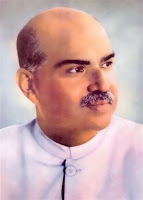Low voter turn out - reflection of low level of sense of constitutional morality
Low voter turn out in phase one of national election 2024- Lok Sabha bears signature of low level of sense of constitutional morality .
Constitutional Morality , explained by Dr Ambedkar in Constituent Assembly while introducing the draft Constitution in Constituent Assembly.
CONSTITUENT ASSEMBLY OF INDIA DEBATES (PROCEEDINGS)- VOLUME VII
Thursday, the 4th November 1948
The Honourable Dr. B. R. Ambedkar (Bombay: General):....Grote. the historian of Greece, has said that:
"The diffusion of constitutional morality, not merely among the majority of any community but throughout the whole, is the indispensable condition of a government at once free and peaceable;since even any powerful and obstinate minority may render the working of a free institution impracticable, without being strong enough to conquer ascendency for themselves."
By constitutional morality Grote meant "a paramount reverence for the forms of the Constitution, enforcing obedience to authority acting under and within these forms yet combined with the habit of open speech, of action subject only to definite legal control, and unrestrained censure of those very authorities as to all their public acts combined too with a perfect confidence in the bosom of every citizen amidst the bitterness of party contest that the forms of the Constitution will not be less sacred in the eyes of his opponents than in his own."
(Hear, hear.)
While everybody recognizes the necessity of the diffusion of Constitutional morality for the peaceful working of a democratic Constitution, there are two things interconnected with it which are not, unfortunately, generally recognized. One is that the form of administration has a close connection with the form of the Constitution. The form of the administration must be appropriate to and in the same sense as the form of the Constitution. The other is that it is perfectly possible to pervert the Constitution, without changing its form by merely changing the form of the administration and to make it inconsistent and opposed to the spirit of the Constitution. It follows that it is only where people are saturated with Constitutional morality such as the one described by Grote the historian that one can take the risk of omitting from the Constitution details of administration and leaving it for the Legislature to prescribe them. The question is, can we presume such a diffusion ofConstitutional morality? Constitutional morality is not a natural sentiment. It has to be cultivated. We must realize that our people have yet to learn it.
Point of introspection is that despite high level of literacy why voter feels disinterested in elections which is of national importance. Has the Indian education system failed to develop the sense of responsibility towards national issues. NOTA was introduced with the thought that people must have choice of not selecting any candidate contesting the electing thereby expressing his displeasure on the selection of the candidates. But low turn out of voter reflects apathy and disinterest towards representative parliamentary democracy . Question is not who wins but the question is about the participatory democracy. In order to encourage voter it is suggested that Casting vote be made part of the Fundamental duty in the Constitution of India. Will this be of any help ? or some advantages or disadvantages be attached with the voting rights like linking the voting right with the benefits of social welfare schemes or some token penalty be imposed for not participating in the representative democracy through secret vote .
Low voter turn out warrants sincere introspection of political parties , Election Commission so that faith and trust in the first line of the Constitution of India is further cemented and strengthened upholding the spirt of We, the People of India .
.jpg)



Comments
Post a Comment